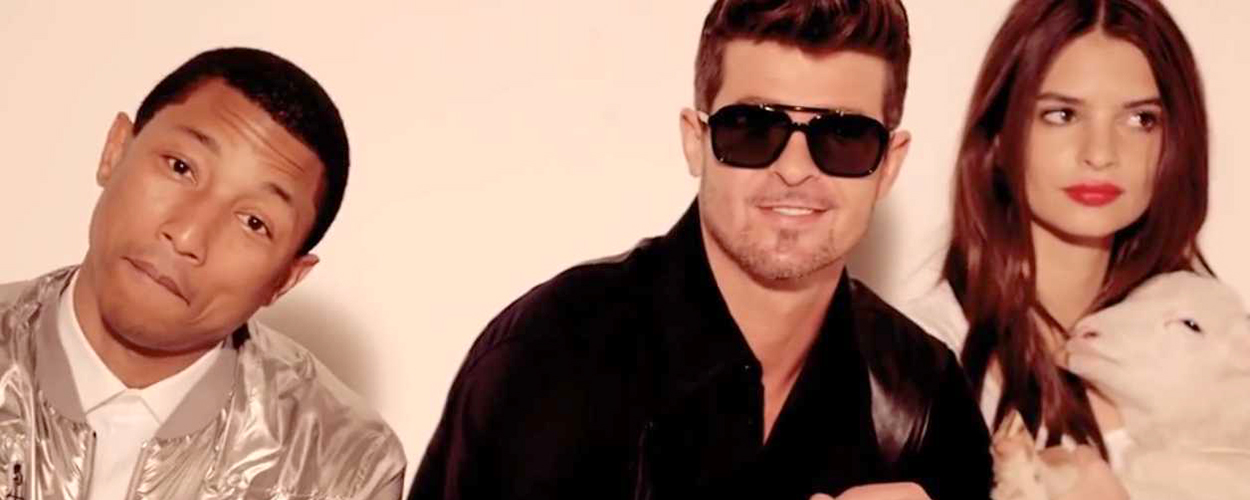This website uses cookies so that we can provide you with the best user experience possible. Cookie information is stored in your browser and performs functions such as recognising you when you return to our website and helping our team to understand which sections of the website you find most interesting and useful.
And Finally Artist News Legal
Pharrell Williams did not perjure himself during Blurred Lines song-theft battle, judge rules
By Chris Cooke | Published on Wednesday 17 February 2021

Robin Thicke has said that he’ll never make another music video like the one that accompanied his somewhat controversial hit ‘Blurred Lines’. But would his old best bud and ‘Blurred Lines’ collaborator Pharrell Williams ever perjure himself again when talking about that particular song? No, of course he wouldn’t. Although – and we can’t stress this enough – he never did perjure himself in the first place.
Did he write an anthem celebrating rape apologists? Yes, he did. Did he appear in an unapologetically misogynistic video to promote that song? Yes, he did. Did he perjure himself? No, he did not.
Or at least that is the conclusion of US judge John Kronstadt, ruling on what was a bit of a postscript to the headline-grabbing bust up over the other controversy that surrounded ‘Blurred Lines’, ie it being a big old rip off of Marvin Gaye’s ‘Got To Give It Up’.
The Gaye estate, of course, won its copyright infringement lawsuit against Thicke and Williams in a ruling that was almost as controversial as ‘Blurred Lines’ itself. With Thicke and Williams having ripped off Gaye’s earlier work on their big hit, the estate was awarded a neat $5 million in damages.
However, the estate didn’t get its legal costs covered. So last year it returned to court in a bid to pass on its legal bills to Williams. That was all based on an interview the producer had given to GQ in 2019 in which he talked about ‘Blurred Lines’.
In that interview, the estate argued, Williams made comments that contradicted what he had earlier said under oath as the song-theft case went through the motions. Which means he lied under oath, aka committed perjury. And that should be grounds to force Williams to pay the estate’s legal costs.
Needless to say, Williams told GQ that the ‘Blurred Lines’ ruling was the wrong ruling. Yes there were similarities between ‘Blurred Lines’ and ‘Got To Give It Up’, but he’d only borrowed a “feeling” from the earlier song, and you “can’t copyright” that.
He also told the magazine: “What [we’d] always try to do was reverse engineer the songs that did something to us emotionally and figure out where the mechanism is in there, and … try to figure out if we can build a building that doesn’t look the same but makes you feel the same way”.
“I did that in ‘Blurred Lines'”, he added, “and got myself in trouble … I really made it feel so much like [‘Got To Give It Up’] that people were like, oh, I hear the same thing”.
But, said the estate, all this talk about reverse engineering songs contradicted what Williams had previously said when under oath. Back then he denied ever going into the studio with the idea of making something like ‘Got To Give It Up’.
In a deposition ahead of the big ‘Blurred Lines’ trial, he said: “When I am searching for music, which I don’t expect you to understand this, but we look into oblivion. We look into that which does not exist”.
This and other statements made under oath were “irreconcilable” with the GQ interview, the Gaye estate said in a legal filing last year, adding “it is thus clear that Mr Williams’ testimony under oath in the courtroom and in deposition was untruthful”. Hence the court should reconsider the legal costs point.
But in a new ruling, Kronstadt says that the estate’s claims that Williams committed perjury are “unpersuasive”.
“The Gaye parties argue that Williams’ statements in the November 2019 interview contradict the sworn statements that he and Thicke made about the process through which they created ‘Blurred Lines'”, he wrote last week. “They add that they also contradict the testimony about the general process that Williams uses in creating music. This argument is unpersuasive”.
“The statements by Williams during the November 2019 interview were cryptic and amenable to multiple interpretations”, the judge added. “For example, it is unclear what Williams meant by ‘reverse-engineer[ing]’. Read in context, Williams statement about ‘reverse-engineering’ could be interpreted as a process in which he remembers his feelings when listening to particular music, and then attempts to recreate those feelings in his own works”.
“This is not inconsistent with his deposition testimony, in which he claimed that he realised after creating ‘Blurred Lines’ that the feeling he tried to capture in the song was one that he associated with Marvin Gaye”.
“Also unclear is what Williams meant by his reference to ‘channel[ing]’ other musical artists. Read in concert with his deposition and trial testimony, this may refer to the process in which he tries to place in his own works his earlier feelings about certain music. For these same reasons, it cannot be readily determined that the statements by Williams during the November 2019 interview were inconsistent with the one that he looks ‘into oblivion’ when creating music”.
“For these reasons”, the judge concluded, “the Gaye parties have not shown by clear and convincing evidence that there are sufficiently material inconsistencies between Williams’ statements in the November 2019 interview and his sworn testimony, to support a finding of perjury”.
So, there you go. Pharrell is not a perjurer. What a relief!





